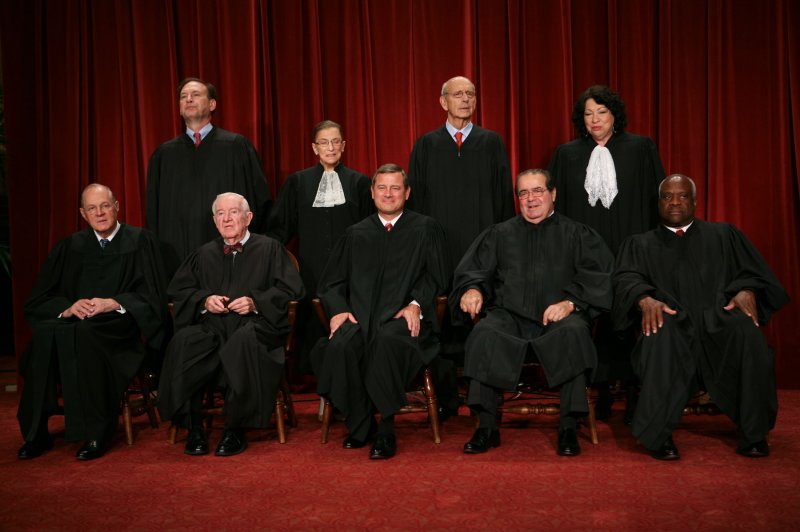The Supreme Court Justices of the United States posed for their official "family" group photo. The justices are John G. Roberts (Chief Justice), John Paul Stevens, Antonin Scalia, Anthony Kennedy, Clarence Thomas, Ruth Bader Ginsburg, Stephen Breyer, Samuel Alito and Sonia Sotomayor. File Photo by Gary Fabiano/Pool/UPI. |
License Photo
WASHINGTON, May 19 (UPI) -- The Supreme Court ruled on Monday that Maryland's income tax law, allowing the state to double-tax residents who pay income tax in a different state where they work, is unconstitutional.
The court ruled with a divided five to four vote on Monday to uphold the Maryland Court of Appeal's 2013 ruling that said the tax law wrongly exposes Maryland residents to double taxation because it does not provide full tax credit for residents who also pay income taxes where they work.
In most states, people are taxed both where they work and where they live, but they receive a full income tax credit for out-of-state earnings.
Justice Samuel Alito wrote the court's opinion, who said the Maryland's tax law forced some residents to pay income taxes to more than one jurisdiction.
"The effect of this scheme is that some of the income earned by Maryland residents outside the state is taxed twice," Alito said. "Maryland's scheme creates an incentive for taxpayers to opt for intrastate rather than interstate economic activity."
He noted that states cannot tax non-resident's income accummulated within the state unless a full credit is given for income residents earn outside the state.
The dissenting opinions, from Justices Ruth Bader Ginsburg, Antonin Scalia, Clarence Thomas and Elena Kagan, defended Maryland's right to tax all of its resident's income, regardless of whether income was earned out of state or already taxed.
"More is given to the residents of a state than to those who reside elsewhere; therefore, more may be demanded of them," Ginsburg wrote in the main dissent. "A taxpayer living in one state and working in another gains protection and benefits from both -- and so can be called upon to share in the costs of both states' governments."
Maryland is one of few places in the United States affected by the ruling. North Carolina and Wisconsin could also be affected, including the cities of New York City, N.Y., Philadelphia, Pa., Cleveland, Ohio, Detroit, Mich., St. Louis, Mo., Kansas City and Wilmington, Del.















